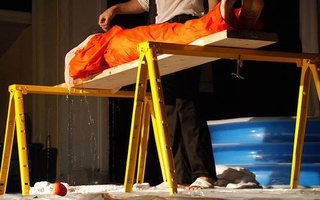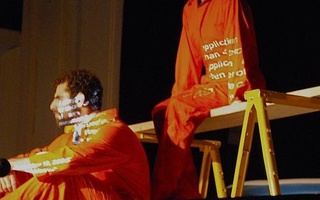FEATUREThe World Wrestling Federation may seem like a uniquely contemporary phenomenon, but anyone who's looked at theatrical history knows that staged depictions of violence are far from new. In order to better understand the dramatic roots of the World Wrestling Federation--its literary ancestry, if you will--we talked to Ayanna Thompson, a fifth-year graduate student in the Harvard English Department who studies dramatic depictions of torture in Renaissance and Restoration England.
The Harvard Crimson: Welcome, Ayanna. Can you give our readers a general overview of the history of stage torture as you understand it?
Ayanna Thompson: Well, stage torture really begins during the Restoration. It seems that in the Renaissance they didn't have a lot of depictions of torture on stage. They followed more of the classical idea that you don't show violence on stage. If you think about Shakespeare's plays, for example, there are very few violent scenes on stage--with, of course, the exception of war scenes, suicide, and murders. But no actual torture.
THC: What about the scene in King Lear where Gloucester's eyes are gouged out?
AT: Gloucester's eyes are the one big exception to that rule. But it's a rather strange scene of torture because they're not trying to get any information from him and they don't use any torture devices. It's a spontaneous moment of violence. But in the Restoration time period, from 1660 to 1700, someone must have developed a stage rack because it's all the rage in Restoration dramas--the tragedies and not the comedies. They're filled with scenes where someone will get racked on stage. It's still uncertain exactly when this stage rack came about or who built it, but it appears to be part of a general trend in the Restoration to outdo the Renaissance. Restoration playwrights were constantly rewriting Renaissance texts and there was a general turn towards depicting more things on stage, including torture.
Read more in Arts
Life on the High-WireRecommended Articles
-
 A Tortured Affair
A Tortured Affair -
 New Courses, New You
New Courses, New You -
 A Tortured Affair
A Tortured Affair -
Atul Gawande Criticizes Supermax PrisonsSupermax prisons, which are designed to hold prisoners in prolonged and strict solitary confinement, are ineffective, expensive, and detrimental to mental health, surgeon and journalist Atul Gawande said during a speech at Harvard Law School yesterday.
-
Change We Can Believe In?Some people ask whether terrorists should have rights. But there is no way to tell who is a terrorist and who isn’t without some sort of fair process.
-
POSTCARD: In the Heart of DarknessIt is impossible to describe the feeling of listening to someone praise a man who was responsible for the torture and death of thousands of Chilean citizens during his brutal 17-year regime.













